#manifesting engine failure for car 4
Explore tagged Tumblr posts
Text
first we lost nowins & now noleads. man we really can‘t have shit
#manifesting engine failure for car 4#i need to find a nee sport#f1#formula one#formula 1#anti lando norris#<- i tagged it everyome back off#if you tb please please please also tag it#singapore gp 2024
138 notes
·
View notes
Text
Common McLaren Car Problems and How to Fix Them

McLaren is known for its high-performance vehicles, combining cutting-edge technology with sleek designs. However, like any car, McLaren models are not immune to mechanical issues. If you're an owner or potential buyer, it’s important to understand the common McLaren car problems and how to fix them. Whether you own a McLaren 570S, 720S, or another model, being aware of these potential issues can help you maintain your car's performance and longevity.
1. Electrical Problems

Electrical issues are a common concern among McLaren owners. These issues often manifest in malfunctioning lights, infotainment glitches, or faulty sensors. McLaren’s advanced electrical systems, while innovative, can sometimes be prone to malfunctions due to their complexity.
Solution: If you encounter electrical issues with your McLaren, it’s best to have a professional technician diagnose the problem. Ensure that the battery and alternator are in good condition, as power supply issues can often cause electrical glitches. Regularly updating your car’s software can also help avoid these problems.
2. Transmission and Gearbox Problems

One of the most frequently reported mclaren problems involves its dual-clutch transmission (DCT) system. Owners have reported issues such as jerky gear shifts, hesitation during acceleration, or even complete gearbox failure.
Solution: If you experience rough shifts or hesitation, it’s important to get your McLaren’s transmission checked by an expert. Often, a software update or recalibration can fix minor shifting issues. In some cases, however, more significant repairs or replacements might be necessary.
3. Overheating Issues

Due to the high-performance nature of McLaren cars, engine cooling is crucial. McLaren cars are equipped with sophisticated cooling systems, but like any high-performance vehicle, overheating can occur under certain conditions, especially if the cooling system isn’t functioning properly.
Solution: Regularly check your coolant levels and inspect the cooling system for leaks. If your McLaren is overheating, it’s essential to have the radiator and fans inspected. Prompt attention to cooling system problems can prevent major engine damage.
4. Suspension and Steering Problems

Some mclaren car issues involve the suspension and steering systems, particularly with models that feature advanced active suspension technology. Owners have reported unusual noises or a decrease in ride quality, which could indicate a problem with the suspension components.
Solution: If you notice a drop in ride quality or hear strange noises when turning or driving over bumps, it’s a good idea to have your suspension checked. McLaren’s suspension system often requires professional servicing to ensure everything is functioning correctly. Timely repairs can help you avoid more costly issues down the line.
5. Brake System Issues

Another common issue McLaren owners face is brake-related problems, particularly with the brake pads and rotors. Due to the performance demands placed on the braking system, McLaren cars often experience wear and tear more quickly than standard vehicles.
Solution: Regularly inspect your brake pads and rotors, especially if you notice a decrease in braking performance or unusual noises. Replacing worn-out components as needed and ensuring the brake system is well-maintained will help keep your McLaren performing at its best.
Final Thoughts
Understanding and addressing McLaren problems early on is key to maintaining your car's performance and value. Whether it’s electrical issues, transmission concerns, or mclaren car common problems, staying proactive about repairs and regular maintenance is essential for ensuring a smooth driving experience. If you encounter any of the issues mentioned, don’t hesitate to seek professional assistance to keep your McLaren running like new.
By staying informed about potential McLaren car issues and knowing how to fix them, you can enjoy the thrills of your McLaren for years to come, without letting small problems get in the way of your driving experience.
1 note
·
View note
Text
Vehicle Repair Services Explained: Common Issues and Solutions for Your Vehicle

Owning a vehicle comes with a responsibility to maintain and repair it when necessary. Vehicle repair services play an essential role in keeping your car in optimal condition, ensuring both safety and performance. In Newry, vehicle repair services are readily available, offering a wide range of solutions to fix any problems that may arise. Whether it's a minor issue or a major repair, understanding the most common problems and how they can be resolved is vital for every vehicle owner.
In this blog, we’ll explore some of the most common vehicle repair issues, the importance of regular maintenance, and the key solutions available through vehicle repair services in Newry.
Common Vehicle Issues Requiring Repair
Vehicles are complex machines with many moving parts that can wear down over time. Some issues are minor and can be fixed easily, while others may require more extensive repairs. Below are some of the most common problems vehicle owners encounter:
1. Brake Issues
The braking system is one of the most essential elements of any vehicle. Brake wear is a common issue, especially if you frequently drive in stop-and-go traffic. Signs that your brakes need repair include squeaking, grinding sounds, or the brake pedal feeling soft. If not addressed promptly, brake failure can lead to serious safety hazards.
Solution: Vehicle repair services in Newry offer comprehensive brake inspections, including replacing worn-out brake pads, checking brake fluid levels, and fixing any underlying problems with the braking system.
2. Engine Overheating
Engine overheating can occur due to various factors, such as a malfunctioning thermostat, low coolant levels, or a damaged radiator. If your engine temperature gauge frequently shows high temperatures, it's a sign that something is wrong.
Solution: A professional mechanic will inspect the cooling system, check for leaks, and replace damaged components. In many cases, simply flushing the coolant system and refilling it with fresh coolant can resolve the issue.
3. Battery Problems
A car battery has a finite lifespan and, over time, it may lose its ability to hold a charge. Common signs of battery trouble include difficulty starting the car, dim lights, and frequent need for jump-starts.
Solution: Vehicle repair services in Newry can test your battery to determine whether it needs a replacement. If your battery is dead, they will install a new one and check the alternator to ensure the charging system is functioning properly.
4. Suspension System Failures
The suspension system is crucial for a smooth ride, absorbing shocks and ensuring vehicle stability. Over time, components such as shock absorbers, struts, and springs can wear out, causing the vehicle to ride roughly or lean to one side.
Solution: Repair services in Newry can perform a thorough inspection of the suspension system, replacing any worn or damaged components. Ensuring that your suspension is in good condition not only improves comfort but also enhances vehicle control.
5. Transmission Problems
Transmission issues can range from minor fluid leaks to complete failure, and they typically manifest as difficulty shifting gears, unusual noises, or transmission fluid leakage. If your car is experiencing these problems, it’s essential to seek professional help as soon as possible.
Solution: Most vehicle repair services in Newry offer transmission repair and replacement, as well as fluid flushes to keep the system running smoothly. Addressing transmission problems early can save you from more costly repairs down the line.
The Importance of Regular Vehicle Maintenance
Preventative maintenance is the key to avoiding many of the issues mentioned above. Regular servicing of your vehicle helps ensure that minor problems don’t turn into major ones. By keeping up with routine maintenance, you’ll not only extend the lifespan of your vehicle but also improve its overall performance. Some key maintenance services include:
- Oil Changes: Frequent oil changes are essential for maintaining the optimal performance of your engine. As time passes, engine oil deteriorates and loses its ability to effectively lubricate the engine parts, resulting in increased wear and tear.
- Tyre Maintenance: Tyres should be checked regularly for wear and tear, proper inflation, and alignment. Worn-out tyres can affect handling and fuel efficiency, and they pose a significant safety risk.
- Fluid Checks: Regularly checking and refilling fluids such as brake fluid, transmission fluid, coolant, and power steering fluid is crucial for the proper functioning of your vehicle.
- Filter Replacements: Replacing the air and oil filters at recommended intervals ensures that your engine receives clean air and oil, improving its performance and longevity.
Why Choose Vehicle Repair Services in Newry?
When it comes to vehicle repair, having a trusted mechanic in Newry is essential. The expertise and services offered by professionals in the area ensure that your car is in good hands. Here are a few reasons why local vehicle repair services are a top choice:
1. Expertise and Experience
Vehicle repair specialists in Newry have extensive experience working with a wide range of makes and models. Whether you drive a compact car, SUV, or commercial vehicle, they possess the skills and knowledge needed to diagnose and repair the issue efficiently.
2. Advanced Diagnostic Tools
Modern vehicles are equipped with advanced computer systems, and diagnosing issues often requires the use of specialized tools. Vehicle repair services in Newry have access to the latest diagnostic equipment to pinpoint problems accurately.
3. Personalized Service
Unlike larger chain repair shops, local vehicle repair services in Newry often provide a more personalized approach. Mechanics take the time to explain the problem, suggest the best course of action, and ensure that you understand the repair process.
4. Cost-Effective Solutions
Local repair services often provide competitive pricing compared to larger dealerships or chain garages. They may also offer flexible payment options, helping to make vehicle repairs more affordable for customers.
Final Thoughts
Taking care of your vehicle is essential to ensure safety, performance, and longevity. Whether you’re dealing with brake problems, an overheating engine, or suspension failures, vehicle repair services in Newry are equipped to handle any issue that may arise. Regular maintenance is also crucial in preventing costly repairs and ensuring that your vehicle runs smoothly for years to come.
For those living in or around Newry, having access to reliable vehicle repair services is a major benefit. So, the next time your vehicle needs attention, you can trust local experts to provide top-quality repairs, getting you back on the road in no time.
By staying proactive and keeping up with routine maintenance, you'll not only save on repair costs but also enjoy peace of mind knowing that your vehicle is in optimal condition. Whether you need a quick fix or a major repair, Newry’s vehicle repair services are here to help!
0 notes
Text
Understanding the Most Common Car Issues and How to Fix Them
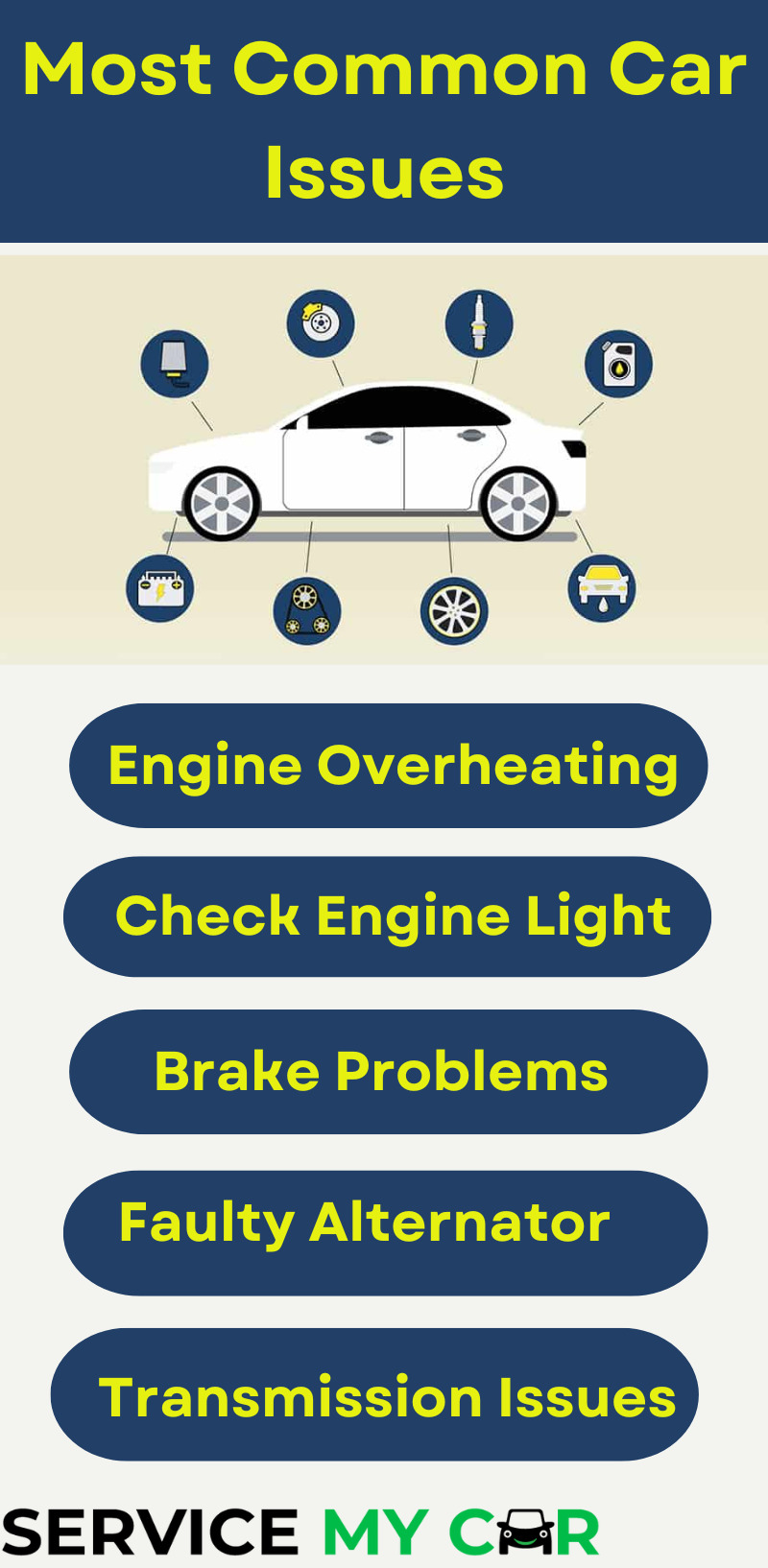
Owning a car can be both a convenience and a headache. While it provides freedom and mobility, dealing with car issues can quickly become frustrating. From strange noises to unexpected breakdowns, there are several common car problems that many drivers encounter. However, understanding these issues and knowing how to fix them can save you time, money, and stress in the long run.
1. Engine Overheating

One of the most common car problems is engine overheating. This issue can be caused by various factors, including a lack of coolant, a malfunctioning thermostat, or a faulty radiator fan. If your car's temperature gauge starts to climb into the red zone, it's essential to address the issue immediately to prevent serious damage to the engine.
How to Fix It: Pull over to a safe location and turn off the engine. Allow the car to cool down before checking the coolant levels. If the coolant is low, refill it with the appropriate type recommended by your vehicle's manufacturer. You should also inspect the radiator hoses for any leaks or damage.
2. Flat Tires

Flat tires are a common occurrence for drivers, especially if you frequently drive on rough roads or encounter debris on the highway. While a flat tire can be inconvenient, knowing how to change it yourself can save you time and money on roadside assistance.
How to Fix It: Start by locating the spare tire, jack, and lug wrench in your vehicle. Loosen the lug nuts, raise the car with the jack, remove the flat tire, and replace it with the spare. Tighten the lug nuts in a star pattern to ensure even distribution of pressure.
3. Dead Battery

Few things are more frustrating than getting into your car, turning the key, and hearing nothing but a faint clicking sound. Dead batteries are a common issue, especially in older vehicles or extreme weather conditions.
How to Fix It: If you have jumper cables and access to another vehicle, you can jump-start your car by connecting the cables to the positive and negative terminals of both batteries. Once the dead battery has enough charge, attempt to start your car. Consider replacing the battery if it continues to lose charge frequently.
4. Check Engine Light

The dreaded check engine light can indicate a wide range of issues, from minor malfunctions to serious engine problems. Ignoring this warning light can lead to further damage and costly repairs down the line.
How to Fix It: Visit a mechanic or use an OBD-II scanner to diagnose the specific issue triggering the check engine light. Common causes include a loose gas cap, faulty oxygen sensor, or catalytic converter failure. Addressing the underlying problem promptly can prevent further damage to your vehicle.
5. Brake Problems

Brake issues can compromise your safety on the road and should be addressed immediately. Common signs of brake problems include squealing noises, spongy brake pedals, or a vibrating steering wheel when braking.
How to Fix It: Inspect the brake pads and rotors for wear and tear. If the pads are worn down or the rotors are warped, they will need to be replaced. Brake fluid levels should also be checked regularly, and any leaks should be repaired promptly.
6. Transmission Issues

Transmission problems can manifest in various ways, including difficulty shifting gears, strange noises, or leaking fluid. Ignoring transmission issues can result in complete transmission failure, which is both expensive and time-consuming to repair.
How to Fix It: Have your transmission inspected by a qualified mechanic if you notice any signs of trouble. Regular maintenance, such as fluid flushes and filter replacements, can help prolong the life of your transmission and prevent costly repairs.
7. Faulty Alternator

The alternator is responsible for charging the battery and powering the electrical systems in your car. A faulty alternator can lead to a dead battery, dimming headlights, or electrical malfunctions.
How to Fix It: If you suspect a faulty alternator, have it tested by a professional mechanic. Depending on the extent of the damage, you may need to replace the alternator to restore proper function to your vehicle's electrical system.
8. Air Conditioning Problems

A malfunctioning air conditioning system can make driving uncomfortable, especially during hot summer months. Common issues include blowing warm air, strange odors, or unusual noises coming from the vents.
How to Fix It: Check the refrigerant levels and inspect the A/C compressor for any signs of damage. Recharging the system with refrigerant or replacing faulty components can help restore proper cooling function to your car's A/C system.
9. Electrical Problems

Electrical problems can manifest in various ways, from a malfunctioning power window to a faulty stereo system. These issues can be frustrating to diagnose and repair but are often caused by loose connections, blown fuses, or faulty wiring.
How to Fix It: Start by checking the vehicle's fuses and relays for any signs of damage or corrosion. Inspect the wiring harnesses for loose connections or exposed wires. If you're unable to identify the problem, consult a professional auto electrician for assistance.
10. Exhaust System Leaks

Exhaust leaks can pose serious health risks due to the release of toxic gases such as carbon monoxide. Common signs of an exhaust leak include loud noises, foul odors, or reduced fuel efficiency.
How to Fix It: Inspect the exhaust system for any signs of damage or corrosion, paying close attention to the exhaust manifold, catalytic converter, and muffler. Replace any damaged components and ensure that all connections are tight and secure.
How Service My Car Assist You?
Wondering where to find a reliable alfa romeo garage? Look no further than Service My Car! Our team of expert mechanics specializes in diagnosing and fixing any issue your vehicle may have. From routine Alfa Romeo maintenance to major repairs, we've got you covered. Trust Service My Car to get you back on the road safely and efficiently. Say goodbye to car troubles and hello to peace of mind with our top-notch auto repair services.
In conclusion, while encountering car issues can be frustrating, knowing how to address them can save you time, money, and stress in the long run. By understanding the most common car problems and how to fix them, you can keep your vehicle running smoothly and avoid costly repairs. Regular maintenance and proactive troubleshooting are key to ensuring a safe and reliable driving experience.
0 notes
Text
Unveiling BMW 2 Series Common Issues: An In-Depth Exploration
The BMW 2 Series stands as a symbol of performance and luxury, yet like any vehicle, it faces common issues. This comprehensive guide delves into these matters, examining their impact on performance, reliability, and whether they should deter potential buyers. From oil consumption to rear axle bolts, power steering glitches, airbag concerns, and more, we'll dissect it all. Let's embark on a journey to uncover the truths about the BMW 2 Series' common problems.
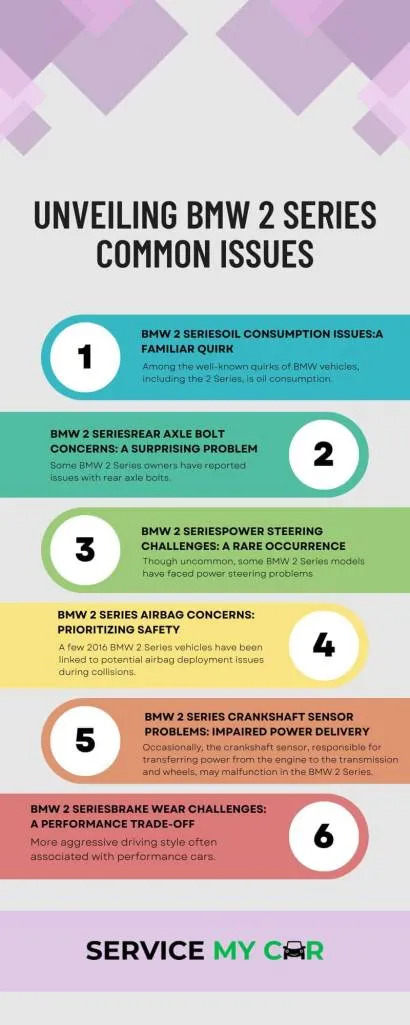
1. BMW 2 Series Oil Consumption Issues: A Familiar Quirk

Among the well-known quirks of BMW vehicles, including the 2 Series, is oil consumption. Due to their high-performance design and operation at elevated temperatures, BMW engines tend to burn oil faster than average. This is mainly due to the gradual wear of piston rings and seals, compounded by the engine's tendency to run hot. Regularly checking and topping up oil levels is crucial to maintaining
optimal engine performance. BMW even provides a travel bag for carrying extra oil, acknowledging the need for occasional top-ups.
2. BMW 2 Series Rear Axle Bolt Concerns: A Surprising Problem

Some BMW 2 Series owners have reported issues with rear axle bolts. Problems arise after rear axle work, where mechanics may fail to adequately tighten or replace the bolts. To prevent complications, it's crucial to ensure new rear axle bolts are used during any modifications or repairs.
3. BMW 2 Series Power Steering Challenges: A Rare Occurrence

Though uncommon, some BMW 2 Series models have faced power steering problems, typically manifesting as pump failures leading to increased steering effort. BMW acknowledges this issue and will replace the pump and any resulting damage under warranty. If you encounter power steering issues, contact your BMW dealer for assistance.
4. BMW 2 Series Airbag Concerns: Prioritizing Safety

A few 2016 BMW 2 Series vehicles have been linked to potential airbag deployment issues during collisions. BMW promptly addressed this concern, with affected drivers receiving successful airbag replacements at authorized dealerships. If you own a
2016 BMW 2 Series, contacting your local dealer to ensure airbag functionality meets standards is advisable.
5. BMW 2 Series Crankshaft Sensor Problems: Impaired Power Delivery
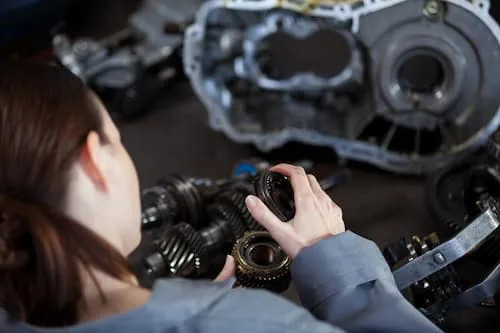
Occasionally, the crankshaft sensor, responsible for transferring power from the engine to the transmission and wheels, may malfunction in the BMW 2 Series. When this occurs, the engine may experience a significant power reduction. If you notice such a loss, it's recommended to have your vehicle inspected by an authorized BMW dealer or mechanic for potential warranty replacement. However, crankshaft sensor issues are relatively rare compared to other reported problems.
6. BMW 2 Series Brake Wear Challenges: A Performance Trade-Off
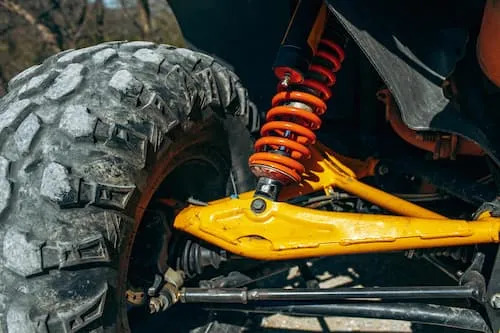
Like any high-performance vehicle, the brakes on the BMW 2 Series may wear out faster due to the more aggressive driving style often associated with performance cars. While BMW brakes may be more costly to replace and require more frequent maintenance compared to standard vehicles, regular upkeep and appropriate driving habits can mitigate excessive wear.
Should You Purchase a Pre-Owned BMW 2 Series Coupe?

Despite the reported issues, the BMW 2 Series remains a highly desirable vehicle, offering a rewarding driving experience. BMW is known for taking care of its customers, often addressing reported problems. Proper maintenance and prompt attention to any issues can ensure you enjoy the performance and luxury the BMW 2 Series offers.
Tips and Considerations for Buying a BMW 2 Series Coupe

If you've decided on a BMW 2 Series Coupe, several factors warrant consideration before making your final decision:
1. Independent Inspection: Essential for Peace of Mind
Prior to purchase, an independent inspection is crucial to identify potential issues that may require costly repairs in the future. This thorough examination helps gauge the car's overall condition and aids in making an informed decision.
2. Vehicle History Report: Unveiling Hidden Details
Obtaining a vehicle history report provides insights into the car's past, including accidents and maintenance records. Reviewing this report helps determine if the vehicle has been well-maintained and if any major incidents or repairs have occurred.
3. Maintenance Records: Insight into Care History
Reviewing maintenance records is vital to ensure the vehicle has received regular upkeep, such as oil changes, as outlined in the owner's manual. This adherence to maintenance schedules contributes to the car's longevity and performance.
4. Availability and Mileage: Finding Your Ideal Coupe
Given the limited production numbers of BMW 2 Series Coupes and owners' tendency to hold onto them, finding one may prove challenging. However, this also means you may encounter well-maintained, low-mileage examples. Consider your preferences regarding mileage and availability when searching for your ideal 2 Series Coupe.
In Conclusion
Despite the reported issues, the BMW 2 Series offers a remarkable driving experience synonymous with luxury and performance. With proper maintenance and timely attention to any issues, you can confidently enjoy owning a BMW 2 Series Coupe. Conducting thorough research, obtaining an independent inspection, reviewing the vehicle history report, and considering availability and mileage will aid in making an informed decision.
Still wondering what’s the best garage for car paint shops in Bolton? Service My Car in Bolton is your go-to destination for all car paint repair needs. We understand that maintaining the aesthetic appeal of your vehicle is just as important as ensuring its mechanical health. When you are searching for "car paint shops near me", look no further than our renowned service. Our team of skilled professionals are dedicated to delivering a top-notch car paint repair service that will restore your car's shine and gloss.
0 notes
Text
Role of Mechanics in Emergency Roadside Assistance Services

When the unpredictable happens on the road, drivers find themselves in a dead-end stranded with a vehicle hiccup. It is when the roadside assistance mechanics emerge as the ideal saviors. Beyond the observable aspects of towing and fixing, these skilled professionals bring huge expertise to the scene. In this exploration, we shed light on the versatile role of these technicians in roadside assistance, stressing their unique skill set, diverse responsibilities, and the profound impact they have on ensuring drivers' peace of mind.
The Expertise of Roadside Assistance Mechanics:
Roadside assistance mechanics manifest versatility, armed with a profound knowledge of vehicle intricacies. Their expertise spans the automotive range, encompassing the nuances of cars, trucks, motorcycles, and specialized vehicles. These professionals boast specialized know-how and a keen ability to analyze issues quickly.
Their training goes beyond the traditional, preparing them to manage many circumstances, from flat tires and dead batteries to complicated engine malfunctions. Equipped with profound knowledge, these mechanics are experienced at providing on-the-spot solutions, showcasing their multifaceted roles to deal with the diverse challenges on the roadside.
Responsibilities of Roadside Assistance Mechanics:
Check out the roles and responsibilities of these mechanics.
1. On-the-Spot Repairs:
Roadside assistance mechanics respond quickly, addressing common flat tires to complicated mechanical failures. Their ability to conduct on-the-spot repairs demonstrates their dexterity and technical prowess.
2. Towing Services:
When a quick fix is not viable, mechanics seamlessly transition into coordinating and conducting towing services. Ensuring the safe transport of a vehicle to a repair facility underscores their commitment to customer satisfaction.
3. Diagnostic Skills:
Armed with state-of-the-art diagnostic tools, mechanics can swiftly pinpoint a breakdown's root cause. This diagnostic acumen expedites the repair process and instills confidence in drivers.
4. Customer Communication:
Effective communication is a cornerstone of their role. Mechanics articulate complex issues in a manner understandable to drivers, fostering a transparent and trust-based relationship. They guide drivers through the repair process, detailing estimated timeframes and potential costs.
5. Adaptability:
Roadside assistance mechanics operate in an ever-changing environment. Whether facing adverse weather conditions, heavy traffic, or a diverse array of vehicle makes and models, their adaptability ensures efficient problem-solving.
Impact on Ensuring Smooth Journeys:

The presence of these seasoned roadside assistance mechanics is not merely about fixing vehicles; it's about ensuring smooth journeys for drivers. Their impact resonates through various dimensions, significantly contributing to road safety and driver assurance.
1. Minimizing Downtime:
Mechanics are champions in minimizing downtime for drivers. Their ability to quickly detect and rectify issues translates into minimal disruptions, allowing drivers to get started with their journeys without waiting for too long.
2. Enhancing Safety:
A well-maintained car is always safe for driving. By addressing mechanical concerns promptly, mechanics play a key role in enhancing overall road safety and reducing likely hazards on the road.
3. Building Trust:
Roadside assistance mechanics' competence, professionalism, and reliability go beyond fixing vehicles. They build a foundation of trust between the service provider and drivers, fostering confidence in the trustworthiness of these services.
Conclusion:
In the grand narrative of roadside assistance services, mechanics emerge as the unsung heroes, weaving together technical expertise, adaptability, and customer-centric communication. Their role extends beyond fixing immediate issues; it's about instilling confidence, enhancing safety, and ensuring that every journey finds a smooth and reliable path forward, no matter how interrupted. Contact Casablanca Towing & Recovery for the finest roadside assistance during emergencies. They can turn up 24*7, irrespective of the location.
0 notes
Text
Empowering Audi Innovation: Expert Solutions for Car Electrical Services

In the world of automobiles, where technology and sophistication continue to advance, the electrical system plays a pivotal role in ensuring seamless operation. This intricate network connects various electrical components, energy sources, and accessories that rely on electrical power. Audi, a brand synonymous with cutting-edge engineering and innovation, is no stranger to the complexities of modern electrical systems. However, as the demand for smart features and enhanced convenience in vehicles rises, so does the likelihood of electrical issues. In this article, we explore expert solutions for addressing electrical services in Audi cars.
Understanding Common Electrical Issues and Their Solutions
Electrical issues have become a common concern for Audi car owners, potentially affecting various aspects of vehicle performance and functionality. These problems can disrupt essential features, leaving drivers puzzled and frustrated. Often, the root cause of these electrical troubles can be traced back to inadequate car maintenance. Let's delve into some of the most prevalent electrical issues in Audi vehicles and their respective solutions.
1. Lights Malfunction:
A malfunctioning lighting system can impede nighttime driving, posing safety risks. Interior lights may fail to function correctly, making it challenging to access essential controls. Malfunctions in exterior lights, such as headlights and taillights, can compromise visibility and increase the risk of accidents.
2. Digital Dashboard Display Failure:
When the digital dashboard display malfunctions, crucial warning signs and messages may go unnoticed. This can hinder a driver's ability to stay informed about the vehicle's condition and performance.
3. Ignition Coil and Spark Plug Failure:
Failures in the ignition coil and spark plug can disrupt the combustion process in the engine, impacting energy generation and overall engine performance.
4. Sensor Faults:
Various sensors in an Audi vehicle monitor critical functions, enabling adjustments for safety and improved performance. Commonly, the oxygen sensor is prone to malfunction, which can affect the car's efficiency and emissions.
5. Battery Problems:
Battery issues can lead to various electrical malfunctions, including lighting problems and difficulty starting the car.
6. Starter Issues:
Starter problems can prevent the engine from cranking and starting, rendering the vehicle immobile.
7. Damaged Wires or Connections:
Faulty or damaged wires and connections disrupt the flow of electrical current, potentially affecting multiple components.
8. Blown Fuses:
Blown fuses can lead to the failure of specific electrical features or systems.
These electrical issues can manifest in several ways, such as difficulty starting the car, compromised lighting systems, or loss of essential functions. To address these concerns effectively, Audi provides a range of electrical services, including:
Comprehensive electrical system inspections encompassing fuses, relays, and wiring.
Battery testing and replacement services.
Air conditioning system servicing.
Headlight inspections and bulb replacements.
Oxygen sensor testing.
Alternator servicing.
Spark plug and ignition coil examinations.
Thorough component cleaning and maintenance.
Regular maintenance and servicing by Audi professionals ensure that potential electrical problems are identified early. Cleaning components can help prevent corrosion and damage, while the replacement of faulty parts ensures that the electrical system operates optimally.
Conclusion
While some electrical repairs are straightforward, others can be complex and require the expertise of Audi-trained professionals. For Audi owners, it is advisable to entrust electrical repairs and maintenance to authorized Audi service centers. These experts not only possess the skills and knowledge required but also provide warranties for their services, offering peace of mind to Audi enthusiasts. By addressing electrical issues promptly and professionally, Audi continues to empower innovation and ensure that its vehicles operate at the pinnacle of performance and sophistication.
0 notes
Text
Comprehensive Guide to Common Hyundai Problems and Solutions

1. Engine Problems

The engine, being the heart of any vehicle, plays a critical role in its performance. However, Hyundai vehicles, particularly the 2011 and 2012 Hyundai Sonata models, have been reported to experience various engine-related problems. These range from unusual noises and stalling to even engine seizure.
1.1 Engine Noise
An unsettling ticking sound from the engine is a common issue reported by Hyundai owners, particularly in the 2010–2015 Elantra models. This noise can be indicative of underlying problems including faulty components or inadequate lubrication.
1.2 Engine Stalling
Certain Hyundai models, notably the 2011 Hyundai Sonata, have been reported to stall or cut out unexpectedly. This can pose a significant safety risk, especially when driving at high speeds or in heavy traffic.
1.3 Engine Seizure
The 2011 and 2012 Hyundai Sonata and Elantra models have also been reported to experience engine seizure. This problem often manifests as the engine failing to turn over properly, causing significant disruptions in vehicle performance.
Solutions for Engine Problems
Any engine-related problems should be addressed promptly to prevent further damage. Regular servicing at a trusted Hyundai service center can help detect and rectify these issues early on. Replacing faulty components and ensuring the engine is adequately lubricated can significantly reduce the chances of engine problems.
2. ABS Problems
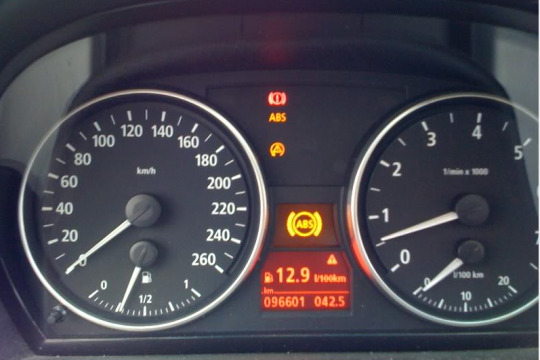
Hyundai vehicles have attracted considerable attention due to a disturbing issue concerning fires originating from the Anti-lock Braking System (ABS). This problem results from liquid leaks and corrosion within the ABS system, often caused by failing seals.
2.1 Causes of ABS Problems
Leaking water into the ABS system can cause the electrics to short out and trigger a spark, leading to a fire. This can occur regardless of whether the vehicle is running or not. Notably, this issue has led to recalls for several Hyundai models, including:
Azera 2006–2011
Sonata 2006
Elantra 2006–2011
Elantra Touring 2007–2011
Santa Fe Sport 2013–2015
Solutions for ABS Problems
The ABS issue requires immediate attention due to its potential safety risks. If you own a model that’s been recalled due to this problem, it’s crucial to take your vehicle to a Hyundai service center for a comprehensive inspection and necessary repairs.
3. Automatic Transmission Problems

Transmission failures can be costly and frustrating, particularly for Hyundai’s automatic transmission vehicles. The 2016 Hyundai Tucson model is known to experience transmission issues, including lack of acceleration after stopping and gear slippage while driving. Both problems can put drivers at risk, making it crucial to address these issues promptly.
Solutions for Transmission Problems
As soon as you notice signs of transmission problems, such as irregular gear shifts or sudden acceleration changes, schedule a service appointment. A qualified technician can diagnose the issue and perform necessary repairs or replacements to restore the transmission’s proper functioning.
4. Steering Problems

Hyundai’s city cars, like the Sonata and Elantra, are reported to have steering and handling issues. These include wobbling and clicking sounds, which could indicate a malfunctioning system that requires immediate attention.
Solutions for Steering Problems
If you encounter steering problems, it’s best to seek professional help from a Hyundai service center. Technicians can inspect the steering components and perform necessary repairs or replacements to ensure safe and smooth driving.
5. Self-Healing Paint Problems

Hyundai’s self-healing paint, designed to repair minor scratches and marks, has faced some backlash from owners. While it works initially, models such as the 2006–2016 Santa Fe, Sonata, and Elantra often experience peeling paint over time. The UV exposure causes parts of the paint to melt and repair scratches, leading to loose and uncovered areas that peel over time.
Solutions for Paint Problems
A professional bodywork technician can help rectify this issue and prevent further damage in the future. Regular waxing and using car covers can also help protect the paint from harsh weather conditions and UV exposure.
6. Hyundai Reliability

Overall, Hyundai vehicles are known for their reliability. However, like any other brand, individual models and years may vary in terms of dependability. It’s always recommended to research specific models and their common issues before purchasing.
6.1 Least Reliable Hyundai Model
The 2011 Hyundai Sonata has been reported as the least reliable Hyundai model due to its numerous issues, including airbags and electrical system problems.
6.2 Most Reliable Hyundai Model
On the other hand, the 2018 Hyundai Kona stands out as the most reliable Hyundai model, with fewer reported issues and no recalls.
7. Hyundai Service and Maintenance

Regular servicing and maintenance play a crucial role in keeping your Hyundai in top shape. Whether it’s engine checks, transmission repairs, or paint maintenance, a professional Hyundai service center can provide comprehensive services to ensure your vehicle’s longevity.
8. Hyundai Insurance

Insurance is another crucial aspect to consider when owning a Hyundai. It’s essential to compare quotes from different providers to ensure you get the best deal.
9. Hyundai Recalls

Staying updated with Hyundai recalls is essential for maintaining your vehicle’s safety. If your model is included in a recall, ensure you take it to a service center for necessary repairs.
10. Conclusion
While Hyundai vehicles may have some common issues, they’re generally considered reliable and affordable choices. Regular servicing at a trusted Hyundai service center can help detect and address these problems early on, ensuring your Hyundai remains in excellent condition for years to come.
Remember, every car has its quirks and issues. What matters is being aware of them and knowing how to effectively address them to enjoy a safe and smooth driving experience.
We sincerely appreciate your interest in our blog discussing Wondering, how to find the best car garage to check car battery replacement? Open google type car battery replacement near me and you will find service my car on the top to get the best car service in the Bolton.
Service my car today to keep your Hyundai in top condition!
1 note
·
View note
Text
The Most Common Problems with Jeep Cars and How to Address Them
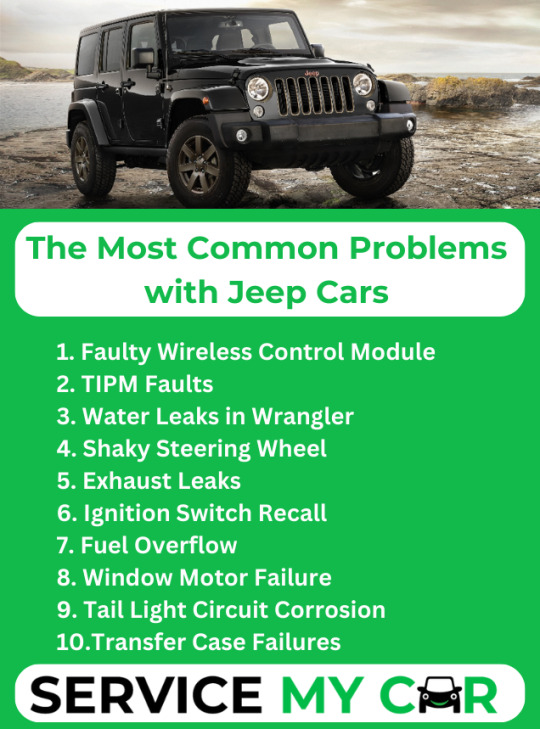
When it comes to owning a Jeep, there's no denying the thrill and adventure that comes with it. However, like any vehicle, Jeeps are not immune to certain issues and problems that can arise over time. From faulty wireless control modules to water leaks and shaky steering wheels, it's important for Jeep owners to be aware of the common problems they may encounter and how to address them. In this article, we'll explore the most common problems with Jeep cars and provide some tips and solutions for resolving these issues.
1. Faulty Wireless Control Module

One of the common problems that Jeep owners may face is a faulty wireless control module. Key fobs, which provide the convenience of wireless remote keys, can sometimes fail, leaving owners locked out of their vehicles or unable to start the car due to a failure in the computer system's communication with the wireless control module. While frustrating, this issue can be easily fixed by a qualified technician.
2. TIPM Faults
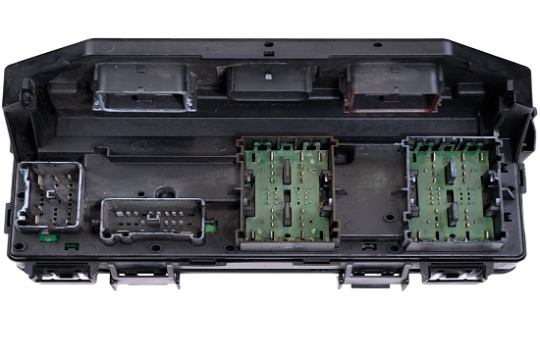
Jeep's Totally Integrated Power Module (TIPM) is responsible for the operation and maintenance of the entire electrical system in the vehicle. Faults in the TIPM can lead to various issues, such as sudden loss of power or an inability to start the vehicle. In some cases, the faulty TIPM module may need to be replaced, which can be a costly repair.
3. Water Leaks in Wrangler
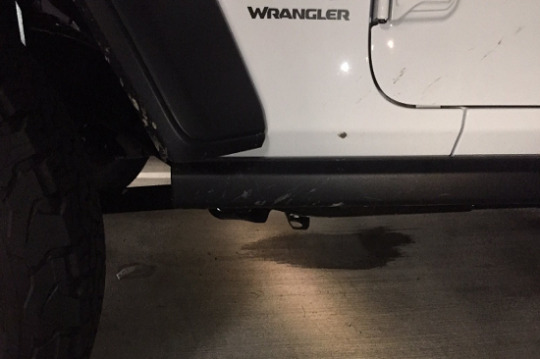
Off-road enthusiasts expect their vehicles to withstand challenging terrains without experiencing weather-related issues inside the cabin. However, some Jeep Wrangler owners have reported water leaks from the upper corners of the front doors, leading to pooling water on the vehicle's floor. Addressing this issue may require inspecting and replacing door seals or weather stripping.
4. Shaky Steering Wheel

Jeep owners of models like the Wrangler and Grand Cherokee may encounter what is commonly referred to as the "Death Wobble." This issue manifests as a shaking and vibrating steering wheel when driving at high speeds or after hitting a bump. Although there haven't been any reported accidents caused by the Death Wobble, it is still important to address this issue promptly. Consulting with a qualified technician can help identify and resolve any worn steering or suspension parts that may be contributing to the problem.
5. Exhaust Leaks
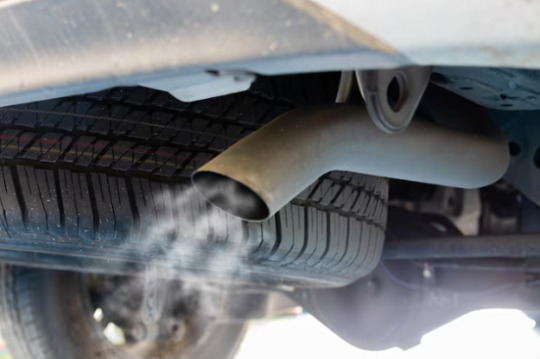
Certain Jeep models, including the Cherokee, Grand Cherokee, and Wrangler with the 4.0-liter 6-cylinder engine, have been known to develop exhaust leaks. This issue is often caused by cracks in the exhaust manifold due to repeated heating and cooling. Signs of an exhaust leak may include ticking sounds from the engine or reduced fuel mileage. It is crucial to address this issue promptly to prevent further damage and ensure optimal engine performance.
6. Ignition Switch Recall

Owners of 2006 and 2007 Jeep Grand Cherokees or Commanders should be aware of a recall related to ignition switch faults. This issue can cause the engine to switch off while driving, posing a safety risk. It is essential to have the ignition switch replaced by an authorized dealer or service center if it hasn't been done already.
7. Fuel Overflow
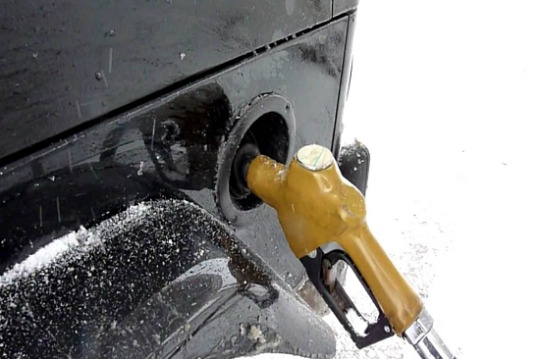
Some Jeep models, particularly the 2005-2012 Wranglers and 2005-2011 Liberties, have been reported to experience issues with gas overflowing when filling up the tank. This problem can have various causes and potential solutions, ranging from a new filler neck to a replacement gas tank. Addressing this issue promptly is crucial to prevent any hazardous situations and maintain the vehicle's overall performance.
8. Window Motor Failure

Jeep models like the Grand Cherokee and Liberty have been affected by issues with window regulators and motors. Drivers may experience sudden window drops while driving or the complete failure of window motor operation. It is recommended to inspect and potentially replace damaged or misaligned window regulators if window motor failure occurs.
9. Tail Light Circuit Corrosion

Grand Cherokees have been known to suffer from corrosion in the tail light circuit boards. This can result in non-functional lights even after replacing bulbs. To address this issue, it may be necessary to replace the circuit board or the entire tail light assembly. Regular inspection and maintenance of the tail light seals can help prevent water seepage and subsequent corrosion.
10. Transfer Case Failures

The transfer case is responsible for shifting a Jeep between 4WD and 2WD. Over time, the seals in the transfer case can break down, leading to leaks and potential wear on the gears. Monitoring and addressing transfer case leaks promptly can help prevent further damage and maintain optimal performance. Additionally, adjusting the transfer case shifter rod alignment may resolve issues with engaging 4WD.
Thanks for giving your valuable time to read this blog, In case you are having another brand car for example Skoda and you are looking for a skoda repair center then visit Service My Car website in case you need any service or repairs.
Conclusion
Owning a Jeep comes with its fair share of challenges, but being aware of the common problems and how to address them can help ensure a smooth and enjoyable driving experience. Whether it's a faulty wireless control module, water leaks, or issues with the TIPM or exhaust system, prompt attention and regular maintenance are key to keeping your Jeep in top shape. By staying proactive and seeking professional assistance when needed, Jeep owners can overcome these common problems and continue to enjoy the thrill of their off-road adventures.
0 notes
Text
Common Automotive Problems: Causes, Solutions, and Prevention
Introduction:

Automobiles have become an integral part of our daily lives, providing us with convenience, mobility, and comfort. However, just like any complex machinery, cars are susceptible to various problems that can be frustrating and costly for vehicle owners. In this article, we will explore some of the most common automotive problems, their causes, potential solutions, and preventive measures that can help you maintain your vehicle's health and save money in the long run.
1. Battery Issues:
One of the most frequent problems car owners encounter is a dead or weak battery. This can be caused by a variety of factors, including old age, leaving lights on, or a faulty charging system. Regularly checking and maintaining your battery, such as cleaning the terminals and ensuring proper charging, can help prevent battery-related issues. Additionally, replacing the battery within the recommended time frame can save you from unexpected breakdowns.
2. Engine Misfires:
An engine misfire occurs when the combustion process in one or more cylinders of the engine is disrupted. It can result from problems such as faulty spark plugs, a malfunctioning fuel injector, or an issue with the ignition system. Regular tune-ups and timely replacement of spark plugs and ignition components can help prevent engine misfires. If you experience a misfire, it's essential to address it promptly to prevent further damage to the engine.
3. Overheating:
Overheating is a common problem, often caused by issues with the cooling system. Factors like a faulty thermostat, coolant leaks, or a malfunctioning radiator fan can lead to engine overheating. Regularly checking coolant levels, inspecting hoses and connections, and flushing the cooling system as recommended by the manufacturer can help prevent overheating. If your vehicle's temperature gauge rises, it's crucial to pull over safely and allow the engine to cool down before continuing your journey.
4. Transmission Troubles:
Transmission problems can range from minor issues like slipping gears to major failures that render the vehicle undrivable. Problems can arise due to low transmission fluid, worn-out clutch components, or electronic malfunctions. Regular maintenance, including fluid changes and inspections, can help prolong the life of your transmission. It's important to address any signs of trouble promptly, such as difficulty shifting gears or unusual noises, to avoid costly repairs or replacements.
5. Brake System Failures:
A properly functioning brake system is crucial for your safety on the road. Brake problems can include worn-out brake pads, malfunctioning calipers, or brake fluid leaks. Regularly inspecting brake components, replacing pads when necessary, and flushing the brake fluid at recommended intervals can help prevent brake system failures. If you notice any signs of brake trouble, such as squeaking or a soft brake pedal, it's imperative to have them inspected and repaired by a professional.
6. Electrical System Malfunctions:
Modern vehicles rely heavily on complex electrical systems to operate various components. Electrical problems can manifest in issues with the battery, alternator, starter, or faulty wiring. Regular inspections, ensuring proper battery connections, and promptly addressing any electrical malfunctions can prevent larger problems and costly repairs. It's advisable to seek professional help for electrical issues as they can be challenging to diagnose and fix without the necessary expertise.
Conclusion:
Owning a vehicle comes with its fair share of challenges, but understanding common automotive problems and taking preventive measures can save you from unnecessary stress and expenses. Regular maintenance, timely repairs, and heeding warning signs can go a long way in keeping your car running smoothly and ensuring your safety on the road. Remember, when in doubt, consult with a qualified automotive professional who can diagnose and resolve complex issues. By being proactive and attentive to your vehicle's needs, you can extend its lifespan and enjoy a hassle-free driving experience.
1 note
·
View note
Text
5 Faulty Rear Differential Symptoms

Understanding the signs of a faulty rear differential will help you avoid many drivability problems. A differential is a crucial element that improves the way your wheel system handles. It sends power to certain wheels from the vehicle's engine and transmission. A differential gives you more steering control over your car because it prevents the wheels from rotating at the same speed.
A rear differential is a feature of vehicles having rear-wheel drive. A front differential or transaxle, which serves the same purpose as differentials, is added to front-wheel drives. Vehicles with all-wheel drive (AWD) and four-wheel drive (4WD) have both front and rear differentials.
By looking online for car service near me garages, you can get it checked out by a competent technician if you start to notice odd noises coming from the wheels or strange vibrations. They are probably indicators of a poor differential. Continuous front differential failure can result in a collision.
No matter what kind of differential you have, you must make sure it is operating correctly. Therefore, if you've ever wondered what the symptoms of a faulty rear differential are, just wait and read for five minutes.
Signs of a Defective Rear Differential
A deteriorating or problematic rear differential will manifest several signs to alert the driver of a problem, just like any other mechanical part would. Here are a few signs that a differential is malfunctioning:
1.Excessive Noise - A failed differential (front and rear) will generate an excessive amount of noise, including whirring, whining, roaring, and buzzing. Whenever you accelerate, decelerate, or turn around a corner, these noises will gradually shift. A damaged or worn-out axle or carrier bearing is frequently to blame for a car's humming or whirring noise. A damaged or worn-out ring and pinion gear is typically to blame when it generates a whining or howling noise. A ring and pinion gear failure is typically brought on by wear, scoring, or misalignment. Additionally, when changing from park to drive, you will hear a clunking sound if there is too much gap or backlash between the ring and pinion. Using a telescope, you can determine whether the noise is coming from the back axle or the differential. Additionally, when the differential needs repair or maintenance, the axle itself also needs attention and inspection for any damage that could be caused by a faulty rear axle bearing. Simply put, excessive noise is a typical sign of a damaged rear axle shaft. As soon as you hear any unwelcome or excessive noises, look online for car repairs near me garages and make an appointment for your vehicle.
2.Failure of the differential due to lack of lubrication - First, check for leaks at the rear differential gasket. Next, inspect the region around the back axle for leaks. When a leak is severe enough, dirt and oil will gather directly beneath the carrier, the pinion gear, or the regions where the brake system is installed. Leaks can happen at the pinion gear seals. If you are not familiar with cars, it is better to leave it to the experts by looking online for car maintenance near me garages and scheduling an appointment with a qualified technician.
3.Differential overheating - Differential overheating can be brought on by overloading when towing a big trailer or loading machinery, the improper type of oil being used, a lack of lubrication, worn gears, high bearing preload, backlash between the ring and pinion, or worn gears. Low differential fluid is clearly indicated by differential overheating.
4.Difficulty in handling the wheels - Imagine that you are having trouble controlling your wheels, particularly when turning a bend. In that situation, you might need to stop and inspect your differential as well as any further attached parts, like the universal bearing and propeller. If your differential is worn out, handling your car could become difficult, which could lead to an accident. If your vehicle is acting strangely before it reaches this point, schedule an appointment with a certified mechanic by looking online for car mechanics near me.
5.Vibration -Unusual vibrations coming from your car can be quite concerning. It can be a sign of a rear-end differential or another car problem coming from the back wheels. When your back wheels vibrate, immediately check your differential or call a mechanic for a detailed inspection.
#mot history#check mot#check mot history#mot history check#check mot status#mot status#check my mot history#mot history checker#mot testing service
1 note
·
View note
Text
Part 70 Alignment May Vary: Escape from Hell

Situation: As the players destroy the chains around the demon train’s heart, they are forced through a passage that appears in the heart chamber, rushed up to the “brain” of the train, the front car engine room, where an old conductor with pits for eyes (and four eyes that may remind one of Verrick’s four eyes), tells them of their success in freeing him and his desire to help them murder devils. He also explains that Arbeyach has been left behind in a discarded train car, still living in the world that Arbeyach created for himself, but now unable to flee it.
Alyss tells the train their next destination: the tower of Mammon and the conductor smiles in anticipation. She uses her phone device to signal to the rebels where they are and their situation, then lowers herself to the ground to try and heal her hurts. Aldric returns her bike to her in a cool roleplaying moment and realizes that she is developing feelings for Carrick, which grows his enmity towards the Paladin.
The players also heal up: the soul stuff that Ratticus gave them heals their hurts completely and also cures the curse that was left upon them by Arbeyach.
Then, rushing across the desert towards the city and Mammon’s tower, the players have one more obstacle to face: they are waylaid by Hecate in her gunship as she tries to blow apart the demon train.
The demon train fight I’ve set up to be an unusual one: the players are pulled inside the train’s “skin” and actually fight AS the train against the gunship, combining their hitpoints and using the following rules:
Their life force combined makes up their hitpoints. AC is 10. Each turn player can choose either defense, maneuver, or attack (only attack can be multiple players). Hecate fires her ship’s weapons at the beginning of the turn. The player maneuvering through the canyons gets to dodge Hecate, adding to their base AC of 10 by a d20+Dexterity or Wisdom roll. The player on defense can subtract damage by a D20 roll + either constitution or charisma. If no one is on defense, this doesn’t happen. Hecate has the following attacks, and DM either chooses or rolls randomly to determine effect each round:
Missiles: 5 missiles at 6 (1d4+4) each. Instant success.
Dual Lasers: fire twice +13 to hit for 27 (5d10) fire damage
Bombs: Player on maneuver must make a dexterity DC 20 save or else take 39 (6d12) concusive damage, halved on a save. Failure means players roll at disadvantage for all attacks.
Power siphon: a harpoon that steals life. +15 to hit. If it hits, steals 26 (4d12) life, no subtraction.
Then players get to attack. Each player in the attack area can use their normal attacks, using spell slots and all of that as normal, but everything is amplified as the train mimics the attack with its own demonic version (so an attack with Imoaza’s scythe may manifest as clawed hands erupting from the side of the train and tearing into the gunship), adding two more damage dice, but no damage modifiers.
Hecate has 212 hitpoints and AC 19. Her saves are +7. She can’t be affected by conditions. She is immune to poison damage. If there are more than three players, she gets an extra attack for each weapon for every three players.
After a drawn out but dynamic fight where Hecate’s rage builds more and more and her mother, Imoaza, continues to taunt her more and more viciously, Hecate’s ship finally blows an engine and she crashes in the desert.
The players are told to cure up, get a short rest and they’ll be at the vault soon. Mammon interrupts their journey with another psychic visit to his throne room, but the players completely ignore him while he tries to offer deals and a chance to join his side. Like I pointed out before, he’s really grasping at straws here, and they know it. Carrick finally loses his anger, telling Mammon that he’s the lamest devil they’ve come across, and that the players give zero shits about him. Mammon takes the revelation calmly and informs them that they are ants to him, ants he was debating whether to crush or not. But now he’s made his decision. The psychic connection is cut and the players arrive at Mammon’s tower in a fairly spectacular way: the demon train crashes into the side of it, ripping it open, and deposits them inside, as close to the vaults as it can. Then it races off to fight a new, horrible threat, while the Hells Rebels arrive and Puck flies down from the sky to join them in their race to the vault of the crystals.
The Conductor let out a gleeful laugh, the sound odd coming from his weathered and cracked lips and completely out of place with the rest of his austere appearance. “When a demon dies in battle, our souls return to the Abyss! My greatest foe comes. Today I go out in a blaze of glory! Today is the day I go home!”

I’m going to take a break from my structure here to chat for a moment about the difficulty of setting challenge in Dungeons and Dragons, because it is highlighted by the next scene.
I know Xanathar’s guide and the DM’s guide both have different methods for setting and figuring out good difficulty for fights, but you really can’t know how something will go in Dungeons and Dragons until you are playing it. I have three players at level 12. Xanathar’s guide suggests CR 5 monsters will be a decent match for them. I want this vault to be guarded by Abishai tasked with ensuring that those who enter the vaults are worthy, so I pick two black Abishai and a White Abishai (CR 7s and 6, respectively) and run a fight against them as the beasts drop down from among rows of statues of similar looking monsters. It’s a cool set up, the Black Abishai causing the vaults to become shrouded in shadow which then gives the Abishai advantage on their attacks.
But in three rounds, the fight is over: the players wipe the floor with them!
I was ready in case this happened, and have a Green Abishai standing by. He is a CR 15, and he comes into the arena with his fear effect blasting across the room indiscriminately, terrifying not only the players but the surviving White Abishai. This fight is a little more dynamic and long lasting, as Carrick and Imoaza flee in fear and the Abishai takes over Aldric’s mind, commanding him to turn on his fellows. The fight could have gone either way, but a mixture of poor die rolls from the Abishai and Aldric mean Carrick and Imoaza get a moment to break him free from his mind control and turn the tide on the Abishai.
Side note: there is a fun moment where the Abishai leaves a suggestion implanted in Aldric and Imoaza’s mind to flee from him and go stand in a corner, a suggestion that carries on after the Abishai is dead, and leaves Puck and Alyss and Carrick arguing with them to get moving. It’s also where we develop something deeper between Carrick and Imoaza: Carrick uses the bond they established on The Arc to take her hand and break her from the spell’s hold with soft words. Imoaza, not used to feeling anything and with her emotional wall weakened by the suggestion spell, feels a twinge of something for Carrick. It’s upsetting for her and strange, but maybe a little exciting too. Alyss catches the moment and believes that Carrick and Imoaza are already a “thing” setting us up for all sorts of romantic comedy action later... if we want to go there.
After all of this, the players rush back to the hole caused by the Demon Train, Alyss having stored a ton of crystals in a bag of holding, and leap out of the hole onto The Arc, which swoops down to catch them. The monster the train was fighting (in fact, died fighting, its soul returned to the Abyss) was none other than Tiamet, Queen of the Dragons.
A ridiculously tough beast, I know the players can’t defeat her in a fair fight. I use her toned down stats from the Rise of Tiamet final fight, but even then this is a beast capable of one-shoting an entire party with a single breath attack. And yet Aldric also hits like a beast, able to take off over 40 hitpoints each turn he attacks something. So I have to do a lot of tweaking as the fight progresses in order to achieve what I want this scene to achieve: a crazy final fight as the party flees from Hell.
Captain Krisp ran around the deck of The Arc, shouting orders. His generals and confidants: Ikbaldi the Barbarian, Star the Tiefling, Tinia the Cleric, Otto the Warlock, Jacobs his First Mate, and Geth the Rogue, all leaped to their battle stations, manning guns and turrets and swiveling them all to point at the rear of the ship as Tiamet crashed into them, her claws and talons wrapping around The Arc and hugging it close to her like a cat about to tear into a trapped mouse. Her five heads darted and dove down at the ship, tearing metal and wood apart, dodging bullets (or seeming to ignore them) as the gunners launched assault after assault upon her, raining down a barrage that would have destroyed a fortress. Aldric, Imoaza, and Carrick stood their ground on deck, Aldric laughing as gleefully as ever the Demon Train had at the prospect of facing such a mighty foe. He ran forward and leaped towards the nearest head, even as it swung around to regard him with fire in its eyes.
I recently did a podcast where I talked about setting difficulty for encounters in DnD 5e. In it, I come to the conclusion that one of the best ways to go about creating good encounters is to let the game world and your plot tell you what needs to be where and to worry about the challenge afterwards. Basically, don’t build with numbers: build with story.
In this case, I know I want Tiamet to be the final fight and I want it to be tough, really more of a feel of surviving a siege than a fist fight with a god where they are going to knock her out. Tiamet is (and rightfully so) way above their pay grade. But I also don’t want the fight to be impossible or a straight party kill. That’s why I have Krisp’s team launching barrages of attacks at her, and also why Puck steps in to use some pretty incredible high level magic to shield and block the worst of Tiamet’s attacks (we don’t yet know the limits of Puck’s powers, but the effort does seem to wear him down).
I also don’t want this to be a fight without consequences, so I let the situation and character choice determine where the danger is. For instance, I let the players roll damage for all the gun barrages being launched each turn. I don’t use all of Tiamet’s legendary breath attacks. And when she does unleash her attacks, I make one of them poison (which Imoaza is immune to). Even when she finally unleashes her signature fire breath, rather than make it about pure numbers, where Tiamet’s attacks are left at their full power, I use Puck to reduce damage to a more reasonable place for the player level. I also really focus my attacks on Aldric, who is insistent on taking on Tiamet directly, which to me is letting the player character steer this fight. Aldric is playing it like a crazed bad ass, which means he’s drawing the focus of the attacks. After lasting two orounds in close quarters with Tiamet, he does fall unconscious, and here is where Krisp finally rushes forward with a rocket launcher, lobs a missile into Tiamet’s mouth, and calls to everyone to get below deck, that he’s got a final plan.
There is one last challenge I place here. In order to let Carrick grab Aldric and flee, Imoaza places herself in the line of danger to distract Tiamet for one more round. This works, but then Imoaza has one chance, one dodging roll, to get away from Tiamet before she gets hit by a bite attack from the Goddess of Dragons. She makes the roll, but had she failed, the damage certainly would have killed her and we would have to roll up a new character. It’s a moment that creates the mood I want, it takes this fight from the status of story battle to one of real consequence and danger, but I don’t just throw it in: it’s set by player decision and action.
Imoaza rolled forward through the open hatch leading into the belly of The Arc, jaws snapping shut behind her in a rush of hot air and sparks. She stumbled to her feet and kept running as the jaws tried to force their way through the narrow opening.
She soon caught up with Carrick and Krisp and Krisp’s commanders. Aldric was coming to, having been cured by Carrick’s magic. Krisp was yelling into a phone: “Alyss, is everything ready? The crystals are in place? Good! Then let’s do this!”
Krisp--talking a mile a minute about how everything had to come together in a spectacular fashion in order to make this all work and about how hell was never going to be his forever home--leads them down to the hold of The Arc, where the bottom of the ship has opened up to reveal The Surveyor’s repaired massive ship flying beneath them. Krisp tells everyone to jump down, and crew and commanders alike rush to obey, Carrick and Imoaza joining them. Last to go is Aldric and Krisp himself, who stands for a moment looking around the now empty hold.
“She was a good girl,” Krisp says, his voice uncharacteristically sad. “She served well. I’ll be sorry to lose her.” Aldric places a hand on his shoulder. “As a fellow captain, I know what it’s like to lose something. To lose your mount.”
Krisp smiles. “Well, if we are going to lose her, let’s let the girl go out in style, eh?”
He pulls a device with a large red button on it from his waistcoat, then pushes the button. He grabs Aldric and leaps out of the hold with him, shouting his catchphrase: “Let’s get Krispy!”
And behind them, there is a sudden roar as The Arc explodes in a ball of intense flame, engulfing Tiamet who is still wrestling with her prize. They do not see if it is the end of the Dragon Goddess, for they are pulled inside the Surveyor’s Ship and the hatches battened down behind them, and then there is a sudden jolt as the ship, their new Arc, blasts out from the atmosphere and leaves the world of Hell behind, for the vastness of space, and the first step on the long journey home.

Epilogue
Somewhere out in the blasted desert of Hell, Hecate pulls herself from the crash of her ship and rolls onto the hot red rock. She coughs up black tar and smoke and wheezes as she sucks in clean air. Her eyes are slits of rage as she looks towards the city where her foes disappeared. She shakes a fist of rage towards the sky as she manuevers her snake away from her crashed gun ship.
“Mother!” she screams. “I will have my revenge!”
And then, unexpectedly, a voice answers her from behind. She turns and sees something unusual discarded on the rock behind her, a sword, black as night, and emanating all the power that it had promised to its last bearer, before Aldric lost it and Carrick refused to bring it back. Blackrazor speaks to Hecate, and its voice is pure menace:
“Did I hear you say revenge?
3 notes
·
View notes
Text
Failure performance of engine cylinder head gasket
The engine cylinder head gasket should have sufficient strength and be resistant to pressure, heat and corrosion. MTU2000 cylinder head gasket is a common gasket. The cylinder head gasket is directly in contact with high temperature and high pressure gas, so it is easy to be ablated during use, especially around the cylinder mouth curling. What are the manifestations of the ablation failure of MTU2000 cylinder head gasket? How should it be handled?
The ablation failure symptoms of MTU2000 cylinder head gasket include:
(1) Burning between the two cylinder edges of the MTU2000 cylinder head gasket: engine power is insufficient, the car is weak, and the acceleration is poor. Remove the air filter and leave the engine at idle speed.
At the moment, the sound of "pop" can be heard at the inlet of the intake pipe.
(2) The burned part of the MTU2000 cylinder gasket is connected to the water jacket hole: bubbles appear in the water tank, boiling, and white smoke from exhaust.
(The burned part of the 3MTU2000 cylinder head gasket is connected to the oil passage: part of the engine oil will flow into the cylinder and be ablated, and the exhaust will emit blue smoke.
(4) The burned part of the cylinder head gasket of MTU2000 cylinder head gasket is connected to the external atmosphere: the engine is poor in power performance, the economy is deteriorated, and the gasket is damaged.
Common engine cylinder head gaskets are caused by high-temperature and high-pressure gas impacting the cylinder head gasket, which burns out the mouth, guard ring and asbestos plate, causing cylinder air leakage and leakage of lubricating oil and cooling water. In the event of an erosion cylinder gasket failure, the engine's power performance will drop, the cylinder pressure will be insufficient, and in severe cases, the carburetor will backfire and the exhaust pipe will fire.
Diagnosis and elimination of ablation failure of MTU2000 cylinder head gasket:
(1) In addition to judging whether the MTU2000 cylinder head gasket is ablated by detecting the cylinder pressure during use, you can also remove the water tank cover, start the engine running at medium speed, and observe the water tank
(2) Whether there are bubbles coming out of the inside. If it is found that there are continuous bubbles from the water tank filling port, it is ablation of the cylinder gasket.
(3) If the water surface fluctuation is aggravated with the increase of the engine speed, and water is sprayed out at the same time, it will be partly washed away around the water passage of the engine cylinder head gasket. At this time, the fire can be cut off cylinder by cylinder
(4) Find out the non-working MTU2000 cylinder head gasket, remove the spark plug and observe whether the electrode has water droplets;
(5) Start the engine and observe whether there is water or steam sprayed from the spark plug hole to determine whether the MTU2000 cylinder head gasket is burnt. When the engine is working, move your hand around the cylinder head gasket. If you feel a gas rush, the gasket is ablated. When the cylinder head gasket is seriously damaged, it can be
(5) Bubbles are found at the junction of the cylinder head and the cylinder body.
(6) When it is found that the water level in the water tank drops quickly during use, pull out the oil dipstick and check that there is water in the oil (the oil color is yellow or even white), which is a leakage of the MTU2000 cylinder head gasket; in addition, the temperature of the cooling water in the water tank rises too fast , Boiling frequently, the water inlet is turned over, and the water inlet pipe is not dented, the cooling water is not obviously consumed, and the cylinder gasket is leaking. In case of the above phenomenon, the cylinder head gasket should be replaced with a new one.
First aid measures for ablation of MTU2000 cylinder head gasket
If the MTU2000 cylinder head gasket is found to be burned while driving and there are no spare parts, the following first aid measures can be taken:
(1) Remove the engine cylinder gasket and check it carefully. If a small opening is broken, you can fill the broken part with tin foil packed in a cigarette box, tin foil or asbestos thread in a waste capacitor, and tap it carefully.
(2) If the damaged surface is large, dry cowhide pads or cut a piece from the same part of the waste cylinder pad can be used as a substitute, and the vehicle will be repaired according to the technical specifications after returning to the field.
The above is about the malfunction performance and solutions of MTU2000 cylinder head gasket. If you have more questions about the engine cylinder head gasket, please contact Guangzhou Hui Yuan Mechanical & Electrical Co., Ltd.!
0 notes
Text
Common Problems with Nissan Maxima: A Comprehensive Guide
The Nissan Maxima stands out as a sought-after four-door sedan renowned for its robust engine power and smooth ride. However, like any vehicle, it's not immune to issues. This in-depth guide delves into the common challenges that Nissan Maxima owners might face. From air conditioning glitches to transmission hiccups, we'll cover them comprehensively. Whether you're contemplating buying a Nissan Maxima or already own one, read on to discover potential pitfalls and their solutions.
1. Air Conditioning Woes
A prevalent concern among Nissan Maxima owners is a leaking and low-pressure air conditioning (AC) hose, often causing the AC to blow warm air. This issue is notably frequent in 2001 and 2004-2012 models, typically surfacing around 87,000 miles. Repair costs range from $200 to $400, depending on the replacement part and labor expenses.
2. Transmission Challenges
Transmission malfunction and failure pose significant problems, manifesting as jerky shifting, rough gear transitions, stalling, and slow acceleration. The 2004-2006 models are particularly susceptible, with issues arising between 90,000 and 100,000 miles. Repairs for transmission problems can be substantial, averaging between $2,500 and $3,000.
3. Electronic Steering Column Lock (ESCL) Issues
Some 2009-2010 Nissan Maxima models may experience Electronic Steering Column Lock (ESCL) failures, preventing the car from starting. ESCL replacement costs can exceed $1,000, but Nissan has offered free replacements for affected vehicles.
4. Faulty Front Seat Wire Harness
In 2001-2006 Nissan Maxima models, a faulty front seat wire harness issue was identified, with a recall for the 2006 model due to incorrect installation. Vibration-induced short circuits could potentially lead to a fire. Nissan issued a recall in November 2005, offering free replacements for the defective wire harness.
5. Brake Problems
Nissan Maxima brake issues have been reported, with recalls for faulty service brakes. Instances include the 2015, 2016 recalls due to improperly mounted brake calipers and low brake fluid levels. These issues could result in detached calipers and increased braking distances, potentially leading to accidents.
6. Ignition Coil Failures
Older Nissan Maxima models (1995-2002, 2004, 2007, and 2009) have reported ignition coil failures, often accompanied by a check engine light. Immediate repair is crucial to prevent further damage, with replacement costs ranging from $500 to over $660.
7. Power Steering Pump Leaks
The 1995-2001 Nissan Maxima models have been known for power steering pump issues, leading to noisy and unstable steering. Fluid leaks can cause deterioration and failure, with total repair costs ranging from $400 to around $1,000.
8. Other Potential Issues
While the mentioned problems are common, it's essential to note that there may be other issues specific to certain model years or individual vehicles. Thoroughly inspecting a used Nissan Maxima before purchase and regular maintenance can minimize the risk of encountering significant problems.
How Service My Car Assists You?
Have you reached a point where you’re questioning, “Where can I find the top mg garage manchester for my MG car?” Look no further, Service My Car provides premium car servicing, tinting, repair, car recovery, and maintenance services, always within your reach. With meticulous maintenance, cutting-edge diagnostics, and personalized attention, this service ensures that every MG retains its peak performance and luxury. Trust Service My Car for a seamless and bespoke automotive service experience.
Conclusion
The Nissan Maxima, a dependable and powerful sedan, does have its common issues. From AC troubles to transmission glitches, these can incur repair costs. However, with proper maintenance and regular inspections, many problems can be addressed and prevented. If considering a Nissan Maxima purchase, awareness of potential issues is crucial. A well-maintained Maxima can still offer years of enjoyable driving experience.
0 notes
Link
1. Machine learning for response (semi-)automation
In 2016, we predicted a shift from detection to intelligent investigation. In 2018, we’re predicting a shift from rich investigative information toward distilled recommended actions, backed by information-rich incident reports. Infosec analysts have long stopped clamoring for “more alerts!” from security providers. In the coming year, we’ll see increased customer appetite for products to recommend actions based on solid evidence. Machine learning has, in large part, proven itself a valuable tool for detecting evidence of threats used to compile an incident report. Security professionals subconsciously train themselves to respond to (or ignore) the evidence of an incident in a certain way. The linchpin to scale in information security rests still on the information security analyst, and many of the knee-jerk responses can be automated. In some cases, the response might be ML-automated, but in many others it will be at least ML-recommended.
Why now?
The information overload pain point is as old as IDS technology—not a new problem for machine learning to tackle—and some in the industry have invested in ML-based (semi-) automated remediation. However, there are a few pressures driving more widespread application of ML to simplify response through ML distillation rather than complicate with additional evidence: (1) market pressure to optimize workflows instead of alerts—to scale human response, (2) diminishing returns on reducing time-to-detect compared to time-to-remediate.
What can you do?
Assess remediation workflows of security analysts in your organization: (1) What pieces of evidence related to the incident provide high enough confidence to respond? (2) What evidence determines how to respond? (3) For a typical incident, how many decisions must be made during remediation? (4) How long does remediation take for a typical incident? (5) What is currently being automated reliably? (6) What tasks could still be automated? Don’t force a solution on security analysts—chances are, they are creating custom remediation scripts in powershell or bash. You may already be using a mixed-bag of commercial and open source tools for remediation (e.g., Ansible to task commands to different groups, or open source @davehull’s Kansa). Assess how existing solutions can help simplify and automate remediation steps. Check out Demisto, or Endgame’s Artemis.
2. Machine learning for attack automation
“Invest in adversarial machine learning” was listed in our previous two yearly trends because of the tremendous uptick in research activity. In 2018, we’re predicting that one manifestation of this is now ripe for adoption in the mainstream: ML for attack automation. A caveat: although we believe that 2018 will be the year that ML begins to be adopted for automating—for example, social engineering phishing attacks or bypassing CAPTCHA—we don’t think it’s necessarily the year we’ll see evidence in the wild of sophisticated methods to subvert your machine learning malware detection, or to discover and exploit vulnerabilities in your network. That’s still research, and today, there are still easier methods for attackers.
Why now?
There’s been significant research activity to demonstrate how, at least theoretically, AI can scale digital attacks in an unprecedented way. Tool sets are making the barrier to entry quite low. And there are economic drivers to do things like bypass CAPTCHA. Incidentally, today’s security risks and exploits are often more embarrassing than sophisticated, so that even sophisticated adversaries may not require machine learning to be effective, instead relying on unpatched deficiencies in networks that the attacker understands and exploits. So, it’s important to not be an alarmist. Think of ML for attack automation as just an algorithmic wrinkle that adds dynamism and efficiency to automatically discovering or exploiting during an attack.
What can you do?
Protect your users by more than simple image/audio CAPTCHA-like techniques that can be solved trivially by a human. Chances are that if it’s trivially solved by a human, then it’s a target for machine learning automation. There are no easy alternatives—but, moderate success has been obtained in image recognition showing fragments of a single image (say, a scene on the road), and asking to pick out those pieces that have a desired object (say, a red car). Calmly prepare for even the unlikely. Ask yourself: how would you discover whether an attack on your network was automated by machine learning or by old-fashioned enumeration in a script? (Might you see exploration-turn-to-exploitation in an ML attack? Would it matter?) Familiarize yourself with pen testing and red-teaming tools like Caldera, Innuendo, and Atomic Red Team, which can simulate advanced manual attacks, but would also give you a leg-up on automated attacks in years to come.
3. Model compliance
Global compliance laws affect the design, engineering, and operational costs of security data science solutions. The laws themselves provide strict guidelines around data handling, movement (platform constraints), as well as model-building constraints such as explainability and the “right to be forgotten.” Model compliance is not a one-time investment: privacy laws change with the political landscape. For instance, it is not clear how Britain leaving the European Union might affect the privacy laws in the UK. In some cases, privacy laws do not agree—for instance, Irish DPA considers IP addresses to be personally identifiable information, which is not the case across the world. More concretely, if you have an anomalous logins detection based on IP addresses, in some parts of the world the detection would not work because IP addresses would be scrubbed/removed. This means that the same machine learning model for detecting these anomalous logins would not work across different geographic regions.
Why now?
Building models that are respectful of compliance laws is important because failure to do so not only brings with it crippling monetary costs—for instance, failure to adhere to the new European General Data Protection Regulation (GDPR), set to take effect in May 2018, can result in a fine of up to 20 million Euros, or 4% of annual global turnover—but also the negative press associated for the business.
What can you do?
As an end consumer, you would need to audit your data and tag it appropriately. Those who are on AWS are lucky, with Amazon’s Macie service. If your data set is small, it is best to bite the bullet and do it by hand. Many countries prevent cloud providers from merging locality-specific data outside regional boundaries. We recommend tiered modeling: each geographic region is modeled separately, and the results are scrubbed and sent to a global model. Differentially private ensembles are particularly relevant here.
4. Rigor and repeatable experiments
The biggest buzz of the NIPS 2017 conference was when Ali Rahimi claimed current ML methods are akin to alchemy (read commentary from @fhuszar on this subject). At the core of Rahimi’s talk was how the machine learning field is progressing on non-rigorous methods that are not widely understood and, in some cases, not repeatable. For instance, researchers showed how the same reinforcement algorithm from two different code bases on the same data set, had vastly different results. Jason Brownlee’s blog breaks down the different ways an ML experiment can produce random results: from randomization introduced by libraries to GPU quirks.
Why now?
We are at a time where there is a deluge of buzzwords in the security world—artificial intelligence, advanced persistent threats, and machine deception. As a field, we have matured to know there are limitations to every solution; there is no omnipotent solution—even if it were to use the latest methods. So, this one is less of a trend and more a call to action.
What can you do?
Whenever you publish your work, at an academic conference or a security con, please release your code and the data set you used for training. The red team is very good at doing this; we defenders need to step up our game. Eschew publishing your detection results on the KDD 1999 data set—claiming state-of-the-art results on a data set that was popular during the times of Internet Explorer 5 and Napster is unhygienic. (“MNIST is the new unit test,” suggested Ian Goodfellow, but it doesn’t convey a successful result.) Consider using a more realistic data set like Splunk’s Boss of the SOC curated by Ryan Kovar. We understand that in some cases there are no publicly available benchmarks and there is a constraint to release the data set as is—in that case, consider generating evaluation data in a simulated environment using @subtee’s Red Canary framework. When you present a method at a conference, highlight the weakness and failures of the method—go beyond false positive and false negative rates, and highlight the tradeoffs. Let the audience know what kinds of attacks you will miss and how you compensate for them. If you need inspiration, I will be at the Strata Data Conference in San Jose this March talking about the different security experiments that spectacularly failed and how we fixed them. Your efforts to bring rigor to the security analytics field are going to benefit us all—the rising tide does raise all boats.
What won’t happen in 2018
To temper some of the untempered excitement (and sometimes hype) about machine learning in information security, we conclude with a few suggestions for things that we aren’t likely to see in 2018.
Reinforcement learning (RL) for offense in the wild
RL has been used to train agents that demonstrate superhuman performance at very narrow tasks, like AlphaGo and Atari. In infosec, it has been demonstrated in research settings to, for example, discover weaknesses of next-gen AV at very modest rates. However, it’s not yet in the “it just works” category, and we forecast another one to two years before infosec realizes interesting offensive or defensive automation via RL.
Generative adversarial networks (GANs) in an infosec product
Generally speaking, GANs continue to see a ton of research activity with impressive results—the excitement is totally warranted. Unfortunately, there’s also been a lack of systematic and objective evaluation metrics in their development. This is a cool hammer that has yet to find its respective killer application in infosec.
Machine learning displacing security jobs
In fact, we think the assimilation causality may go in reverse: because of ever-improving accessibility of machine learning, many more infosec professionals will begin to adopt machine learning in traditional security tasks.
Hype around AI in infosec
It is a fact that, especially in infosec, those talking about “AI” usually mean “ML.” Despite our best efforts, in 2018, the loaded buzzwords about AI in security aren’t going away. We still need to educate customers about how to cut through the hype by asking the right questions. And frankly, a consumer shouldn’t care if it’s AI, ML, or hand-crafted rules. The real question should be, “does it protect me?”
Parting thoughts
The year 2018 is going to bring ML-for-response, as well as the milder forms of attack automation, into the mainstream. As an industry, compliance laws for machine learning will affect a more general shift toward data privacy. The ML community will self-correct toward rigor and repeatability. At the same time, this year we will not see security products infused with RL or GANs—despite popularity in ongoing research. Your infosec job is here to stay, despite more use of ML. Finally, we’ll see this year that ML is mature enough to stand on its own, with no need to be propped up with imaginative buzzwords or hype.
5 notes
·
View notes
Text
Jeep Fob Keys And Remote Program New Brunswick NJ

New Brunswick Key Replacement administers motor vehicle key smith services for majority of car automaker, years and modles. Arrayed with legitimate key cutting machines and coding computer software and with over 4 years of experience, our workers are able to generate metal blade, key-less entry, laser cut, vehicle anti theft system/PATS or transponder chip key keys on premises for majority of foreign and domestic vehicles providing trusted and resistant vehicle lock-smith service, at a cheap price. If you cleave to rekey an auto door lock, cleave to copy a smart key, need to replace a stolen motor vehicle key or purchased a brand-new car and would like to cut a supplementary key, we arrange an exclusively nimble service anytime you need.
Models: Patriot, Minivan, Bus, Cherokee, Compass, SUV, Liberty, Willys, Comanche, Wrangler, Minibus, Sport, Hybrid, Grand Cherokee and Grand Renegade
Jeep key replacement in New Brunswick NJ
Our Jeep keysmith is an up to date authorship for a excellent and budget Jeep lost key made, dodging the dragging to the dealerships and wait redundant time for your turn. New Brunswick Key Replacement grants unstationary ignition key made, OEM transponder, remote fobik keys, keyless entry or ignition switch recovery at your location, including a 24 hour emergency lock out service for cases like mangled ignition key clipping, lost keys formulation or captured keys in car or trunk and more. New Brunswick Key Replacement care high quality Jeep transponder keys services in New Brunswick NJ on premises.
About Jeep keys and locks system
Jeep is a United States continental manufacturer of automobiles stationed in Auburn Hills, Michigan, the U.S.A Built in 1941 by constructing Sport utility vehicles.
Jeep originate using transponder chipped keys in 1998. Several earliest models keys might be conveniently reproduced utilizing on-board procedure, yet with most current designs the radio frequency message is encoded and a distinct diagnostic tools is required.
Latest designs (since 2007) accepts the Keyless Go as keyless device and pushtostart electric ignition instrumentation.
Ignition repair
If your car doesn't light up, there are oodles of troubles which could be the reason. Since the fuel pump instrumentation and car battery are plugged to the ignition switch, the malfunction might be difficult to troubleshoot by a non-experience hands, but following are a few frequent troubles, which you might have to confront with.
key have problems turning in the ignition
When the ignition key is stiffly turning, it could be for a couple of reasons: Frequently this occurs when the steering is locked by the ignition switch with the car front wheels turned aside (usually happens when you park on a hill) or if a front wheel is pressed with force against something (e.g. sidewalk edge). In this situation, try turning the steering wheel to the sides left and right while lightly shake left and right the ignition gripping the key - this might help to release the steering wheel.
Dead battery
One more common reason why your ignition switch might break down is a failure of the car battery. A dead battery might be due to electronic wiring or alternator failure. When the dash-board lights will not turn on when you turn the key in the ignition, presumably you should call a car mechanic.
The ignition is remarkably important part of any car and consisting of manifold tiny components that might be difficult to troubleshoot by a non-experience hands, so the only thing a driver advised to do suffering from ignition cylinder or key problems is to ensure you’re actually attempting to turn on your own car and call a car lock man to arrive to your place of choice to rekey, reprogram replace the ignition or key which will costs $150–$375.
Chipped key make
Substituting a car transponder chip key is not as simple as getting a metal bladed key! Advanced vehicles incorporate a car main computer which has to be decoded to designate the new chipped key. This compound action has to be done licensed and skilled lockman or by the dealer utilizing suitable key programmer built to ensure that the key is correctly operational and competent to start up your car.
New Brunswick Key Replacement transponder keys personals are totally qualified to program and cut fob-key, transponder, high security and flip-key chip keys for nearly every make, year and model.
Jeep keyless entry
Jeep keyless device let a user to lock and unlock the car doors as well as running the vehicle yet avoiding utilizing the mechanical key, and beginning at 2007, many Jeep models in the market are equipped with some sort of a keyless entry structure that incorporate a brief distance remote transmitter.
With a keyless entry, access to your Jeep is normally attained by transmitting a radio frequency indication message from a remote transmitter to a car computer module on a ciphered channel when the driver just passing by within the range of 5 feet of the car with the keyless entry on a key ring or in the pocket.
This RF indication message and the Jeep smartkey platform, furthermore authorize pushtostart ignition (also called Clutch popping or Clutch starting). Using this system a car owner is adept of flaring up a car by clicking a toggles on the dash-board in place of twisting a key in a key-pit.
Copy vs lost car keys
Car keys lately cost way more then $2.99 mechanical keys at a home depot or hardware store. Modernized Jeep keys have gone high tech laser cut, key-fob, keyless entry and flip key involving transponder keys that should be programmed with diagnostic equipment to the car immobilizer. If the immobiliser does not detect an appropriate chipped key, the fuel supply will subdue and the vehicle will not fire up. This instrument feathers a safety feature assuring the immobilization of a stolen or misplaced key.
Even though dash-board console process is available on several early cars to conveniently copy keys, normally to get another key programmed, the chip in the key need to be programmed by a suitable programmer carried by the dealership or a locksmith which usually cost almost $50-$120 in addition to the cost of the blank key.
Misplacing an original key to a vehicle is a complete different manifestation, since the engine control unit need to be re-coded to employ the new key and deny the original one which actually means that you will have hire a mobile car lock man or tow your vehicle to the dealership.
Using this routine feathers a safety feature assuring the immobilization of the stolen or misplaced key, yet lost key made, platform available solely to a licensed locksmith or the Jeep dealer-ship and accordingly will priced as about $185–$250.
Twenty four hour car lockout
With current transponder key, electronic windows, immobiliser and air-bag infrastructure persistently progressing, locks, keys and ignition besides vehicle lock crackerjack services are turning a whole lot complex to work with. Our popalock staff utilize specialized lock pick tools and procedures to eradicate damaging your vehicle door frames, power lock or electric windows. If you locked your keys in car/trunk, we can come out to you promptly for all your car door and trunk locks obligations,
Car locks alterating
Did you got one of your Jeep keys robbed?, lost all the keys to your car? or procured a fresh Jeep ignition and require to restore an outmoded one?, want to assure that no one else achieve the effectiveness to start your car? Good News! You have landed on the #1 source of information, in that alterating of car locks is one of New Brunswick Key Replacement fundamental facet. Our experts can change the internal pins in your door or ignition lock, so it would use the newish key and disdain the aged one. Gather the cellphone and call our dispatch center to get your car lock modified by a competent lock man in a very short period of time
To sum up
If you’ve ever been through the disturbing scenario when you locking or losing the keys to your car, you most likely understand how valuable it is to have an honest and a thoroughly trained mobile lock-smith service at hand. We bestow the briskest services on hand 24 hours a day 7 days a week and the useful method and skilled lock-smiths qualifies us to be the most dominant vehicle key and lock jobholders in town. . If you are glancing for Jeep key replacement service 24HR in New Brunswick New Jersey, call (973)200-4870 for a reliable local mobile locksmith, lost car keys made, ignition repair, transponder, keyless entry remote fob cut and program.
0 notes